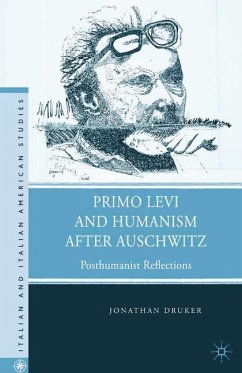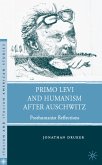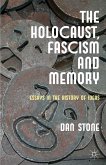"Druker s contrarian reading of Primo Levi in a posthumanist light, through the lens of Adorno, Foucault, Levinas and others, is both bracing and necessary. By eschewing hagiography and reading Levi against himself, Druker probes the symptoms of what he calls the acute blindness of a certain humanism, a humanism which played no small part in the origins and execution of the Holocaust itself. Levi s work is strong enough and important enough to be confronted in this way; indeed, it is far too important not to be so." - Robert S. C. Gordon, Cambridge University and author of Primo Levi s Ordinary Virtues
"Elegantly organized and written with clarity, Druker s study offers a new understanding of Primo Levi for the twenty-first century. Without slighting Levi s crucial achievements as a memoirist of the Nazi camps, Druker breaks decisively with previous hagiographical accounts to reveal the conflicts and contradictions that arise from Levi s desire to hold on to a humanist vision in the wake of the Holocaust. Primo Levi and Humanism after Auschwitz effectively combines close attention to Levi s key works of testimony and reflection with philosophical critique and speculation inspired by such posthumanist thinkers as Adorno, Foucault, Levinas, and Lyotard. Putting the author of Survival in Auschwitz and The Drowned and the Saved into long-overdue, systematic dialogue with post-Enlightenment thought, Druker s book is an exemplary work of literary criticism and a must-read for all who want to understand how the Holocaust continues to pose challenges to the fundamental tenets of modern life." - Michael Rothberg, University of Illinois, Urbana-Champaign and author of Multidirectional Memory: Remembering the Holocaust in the Age of Decolonization
"Elegantly organized and written with clarity, Druker s study offers a new understanding of Primo Levi for the twenty-first century. Without slighting Levi s crucial achievements as a memoirist of the Nazi camps, Druker breaks decisively with previous hagiographical accounts to reveal the conflicts and contradictions that arise from Levi s desire to hold on to a humanist vision in the wake of the Holocaust. Primo Levi and Humanism after Auschwitz effectively combines close attention to Levi s key works of testimony and reflection with philosophical critique and speculation inspired by such posthumanist thinkers as Adorno, Foucault, Levinas, and Lyotard. Putting the author of Survival in Auschwitz and The Drowned and the Saved into long-overdue, systematic dialogue with post-Enlightenment thought, Druker s book is an exemplary work of literary criticism and a must-read for all who want to understand how the Holocaust continues to pose challenges to the fundamental tenets of modern life." - Michael Rothberg, University of Illinois, Urbana-Champaign and author of Multidirectional Memory: Remembering the Holocaust in the Age of Decolonization








